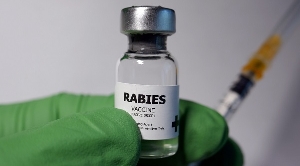26 people died from rabies this year – Veterinary Department

Greater Accra Region recorded the highest number of deaths
Twenty-six persons have died of rabies out of 31 cases recorded in nine regions so far, this year.
While the Greater Accra Region had the highest number of deaths; six, the Central and North East regions recorded four deaths respectively.
The Western Region had three deaths, Western North and Upper West; two, while the Eastern, Ashanti and Upper East regions had one person die respectively from rabies.
The Chief Veterinary Officer at the Veterinary Department, Dr. Emmanuel Allegye-Cudjoe, disclosed this at the launch of this year’s World Rabies Day (WBD) in Accra last Thursday on the theme: “Breaking rabies boundaries.”
Commemorated every September 28, WBD aims at strengthening awareness about the disease which remains a global public health threat and estimated to cause over 55,000 human deaths annually, with 56 per cent of the deaths happening in Africa.
Dr. Allegye-Cudjoe expressed worry over the growing number of stray and unvaccinated dogs, particularly in urban and big cities like Accra and Kumasi where major cases of rabies were reported.
“In 2016, the number of human deaths from rabies had escalated to 57 from 25, recorded between 2009 and 2011. From 2020 to 2023, 793 suspected cases of human rabies were reported resulting in 77 deaths while by the end of 2023, 331 suspected cases were recorded with the Greater Accra Region accounting for 112 of the cases for the period,” he stated.
The Chief Veterinary Officer noted that while rabies was a vaccine-preventable disease, poor knowledge about it and irresponsibility on the part of some owners to vaccinate and confine their pets was driving the rise in cases.
He said ahead of the main event on September 28, the Department together with its stakeholders was embarking on a free or low-cost pet vaccination campaign which will also intensify awareness of rabies through various media.
“The government has obtained over one million doses of rabies vaccines for the exercise this year while experts are also pushing for the review of the Animal Act under the Animal Health Bill 2020 which will improve rabies control in the country and generally, how animals are handled”.
Dr. Allegye-Cudjoe urged the public to observe environmental hygiene by keeping their surroundings clean and report animal bites immediately to veterinary facilities, imploring pet owners also, to send their dogs for periodic vaccinations.
Dr. Benjamin Sasu, the Risk Communications Officer of the Veterinary Services Department, said this year’s WBD would be extended over six months to cover the entire country because of the rise in rabies cases.
“Our main goal is to eradicate rabies in Ghana, especially among children who are most vulnerable to dog bites and scratches so we intend to go to all the regions and engage in awareness creation activities in addition to the campaign which will include free pet vaccinations, educational outreach programmes in schools, social media campaigns, and public events like floats and marches.”
Mr. David Youngs, a Communications Officer at the Food and Agriculture Organisation (FAO), stressed the importance of acting quickly to control zoonotic diseases increasingly affecting humans from animals and the environment.




